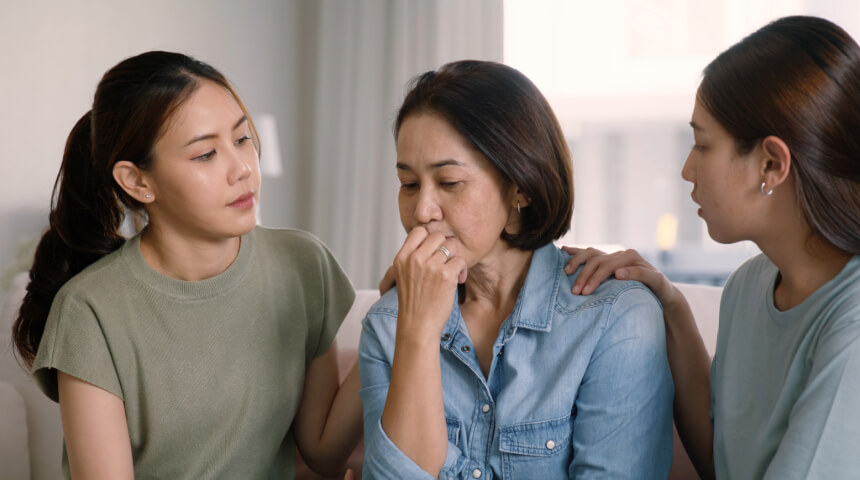It’s true that different cancers each have their own unique symptoms depending on what organs or parts of the body are being considered. Each part of the body comes with its own set of issues. It’s important to know what to watch for so you can get expert help as soon as possible.
Beginning at the top of the body and moving downward, these are the symptoms to stay aware of.
From the Top
Brain cancers can initially present with a severe headache. You may notice a change in your mental status or signs of dementia. Sometimes there is a seizure or severe vomiting. You may experience blurred vision or partial vision loss.
Pituitary tumors (also in the brain) can cause a person’s facial appearance to shift and change as well as larger hands, larger fingers and an increased jaw size. You also may experience a hormonal imbalance, obesity or sexual dysfunction.
With head cancers, one of your tonsils may appear more enlarged than the other. While it may not be painful, you often will have discomfort when swallowing. You may have an ulcer on your tongue, showing as white spots that won’t go away.
Neck cancers often include swelling of the lymph nodes. You may notice multiple lymph nodes in your neck, a definite red flag, which may indicate leukemia or lymphoma in children. If you see this, consider talking to your doctor.
Thyroid cancer may be indicated if you have difficulty swallowing. You may have a goiter or one huge hard nodule in the thyroid gland. It can be felt or discovered with the finger, but you should go to the doctor as soon as you notice it.
Throat cancer can start with problems eating or difficulty swallowing. If it persists, seek medical attention. It could be cancer of the esophagus, back of the throat or stomach.
In Your Middle
Lung cancer is very common and may include a chronic cough. You may suddenly lose weight, notice chest pain or experience shortness of breath.
Abdominal cancers can present with abdominal pain or swelling. You may feel a lump in your abdomen, discover you have a peptic ulcer or feel pain in the upper abdomen. It often includes weight loss, gastrointestinal bleeding, decreased appetite, vomiting (sometimes with blood), yellowed skin and/or eyes or a black, tarry stool.
Colon cancer is very common, especially if you are over 50 years old or have a family history of such. Weight loss, abdominal pain, constipation and diarrhea are all early symptoms.
Kidney cancer can start with blood in the urine. You may feel swelling in the kidney area or you may not feel anything at all. Whenever blood is discovered in the urine, you need to take it seriously and visit your doctor immediately.
Uterine cancers may include bleeding as well as an irregular period. Many times, tumors in the uterus may be an indication of cancer elsewhere. And for young women who notice bleeding after intercourse, cervical cancer is a possibility.
All the Rest
Bone cancer may begin with bone swelling, bone pain or a bone fracture (without trauma). Regular fractures are often the result of trauma, whether it’s a fall or car accident. In pathological fractures, however, the hip or lower/upper extremity may fracture with no trauma. You may lift an object that is less than 10 pounds, for example, and accidentally break your arm in the process.
Blood cancer may begin to reveal itself as severe fatigue, diarrhea, loss of appetite, weight loss, multiple enlarged non-painful lymph nodes, bruises, bleeding gums, a bloody nose, fever, frequent respiratory and/or severe back or rib pain.
Prostate cancer can include difficulty urinating, the need to urinate more often or the presence of blood in your urine.
Bladder cancer symptoms include either blood in the urine or abdominal pain.
Skin cancer can show initially as a brown or dark pigment on the surface of the skin, usually with no hair. A full skin examination is advised annually, especially when areas like the back, neck and buttocks cannot be seen without assistance.
Breast cancer (female) may present as a lump in the breast or bleeding from the nipple. You may have eczema on your nipples or feel pain in the lymph nodes, armpits or neck.
Testicular cancer may cause pain, a mass or swelling in the scrotum.
When in Doubt, Visit Your Doctor
If you have one or more of these listed symptoms, it’s wise to visit your healthcare professional for a thorough examination. For the most up-to-date information and recommended cancer prevention guidelines, visit the National Cancer Institute often as information and guidelines are regularly updated.
Choose to Stay in Touch
Sign up to receive the latest health news and trends, wellness & prevention tips, and much more from Orlando Health.
Sign Up









